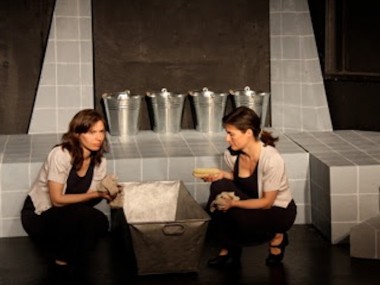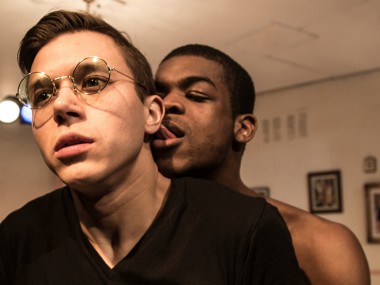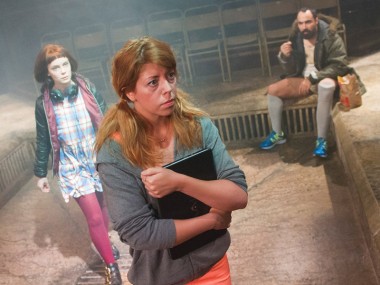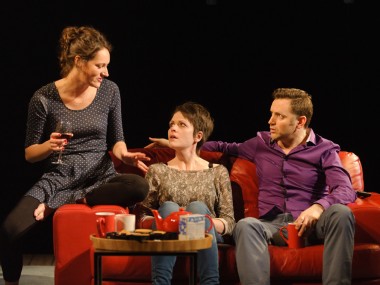Martha, Josie and the Chinese Elvis, Park Theatre
Thursday 2nd January 2020

The 1990s were a great decade for new writing, but although the story of those years is often told as the rise and rise of in-yer-face playwrights — such as Philip Ridley, Anthony Neilson, Sarah Kane and Mark Ravenhill — there were many other talents. These include Charlotte Jones who, before writing her masterpiece Humble Boy, came up with a trio of exquisite, quirky and eccentric entertainments. One of them is Martha, Josie and the Chinese Elvis, which was first put on in 1999 at the Bolton Octagon and is a great example of her terrific writing.
The situation is beautifully bizarre. Josie is a dominatrix, a single mother who has two daughters: Brenda-Marie, with mild learning difficulties, and Louise, who has left home in disgust at the fact that her Mum is a sex worker. Without many friends, Josie faces the prospect of her 40th birthday with dread, especially as she has become increasingly bored with her work. When one of her clients, the middle-aged Lionel (who has a penchant for cross-dressing), suggests holding a party for her, she reluctantly accepts. The only guests are Lionel himself and Martha, Josie’s cleaner (who has a compulsive disorder which means she keeps counting up to five and is terrified of the number six). For entertainment, Lionel invites Timothy, the Chinese Elvis, an impersonator. And, of course, there is also an unexpected guest.
This is a play which lovingly puts on stage a group of flawed eccentrics. One marvellous scene shows Lionel’s sex session with Josie gradually petering out as both lose interest; she is fed up with the work and Lionel, who is more of a friend than a casual client, gets laughs from the fact that his job is a dry-cleaner. The disabilities of both Brenda-Marie and Martha are treated lightly, and Jones is neither condescending nor sentimental about their lives. Likewise Timothy is portrayed as a trainee impersonator, who has only learned a handful of the King’s song, but has costumes which cover both the singer’s slim years and fat years. Each of the characters learns a valuable life lesson before the end of the show.
What is most appealing, however, is the sheer quirkiness of Jones’s writing. There are passages of warm hilarity in which, for example, Lionel’s bald head is humorously compared to a range of apple varieties, as well as bold images, such as the Irish Catholic Martha comparing the real Elvis to a new messiah, or describing her voluntary work sewing little gowns for stillborn babies. Highpoints include Timothy singing a couple of Elvis classics, and a terrific duet version of “Suspicious Minds”. But central to Jones’s brilliance is her understanding of the human heart, in all of its confusing messiness. She is especially perceptive in her depiction of mother and daughter relationships, which come across as a breath of real warmth in the arctic cold of her characters’ loneliness.
Behind the laughs, some of which are more politically incorrect than ever, and the kookiness of the situation, there is also a serious message about how people can get trapped in the identities that they actively build for themselves. The main example is Josie, whose work as a dominatrix has helped her self-assertiveness but at the cost of her happiness, a job which has brought her money yet caused estrangement from her daughter Louise. Each of the other characters find that their social roles — sex worker, dry cleaner, religious believer, celebrity impersonator — are both freeing and restraining. Jones makes sure that all of them find hope in the end, when you can almost hear the psychological strait jackets slipping off each person’s shoulders. The redemptive feel is a very seasonal message.
Robert Wolstenholme, who with actor Kellie Batchelor runs the Signal Theatre Company, directs this entertaining and warmhearted evening with some good set pieces on Amy Mitchell’s brightly coloured set (her pastiche Elvis costumes are great!). Batchelor plays Josie with an emotionally truthful restraint and an acid tongue. Equally convincing are Charlie Bence’s imaginative Brenda-Marie, who adores the 1980s Olympic skaters Torvill and Dean and is more clever than at first appears, and Jessica Forrest’s unhappy and angry Louise. The other three performances — Sioned Jones’s Irish Martha, Andrew P Stephen’s sincere and capable Lionel, and Matt Lim’s Timothy — are similarly well crafted. A lovely revival.
© Aleks Sierz




